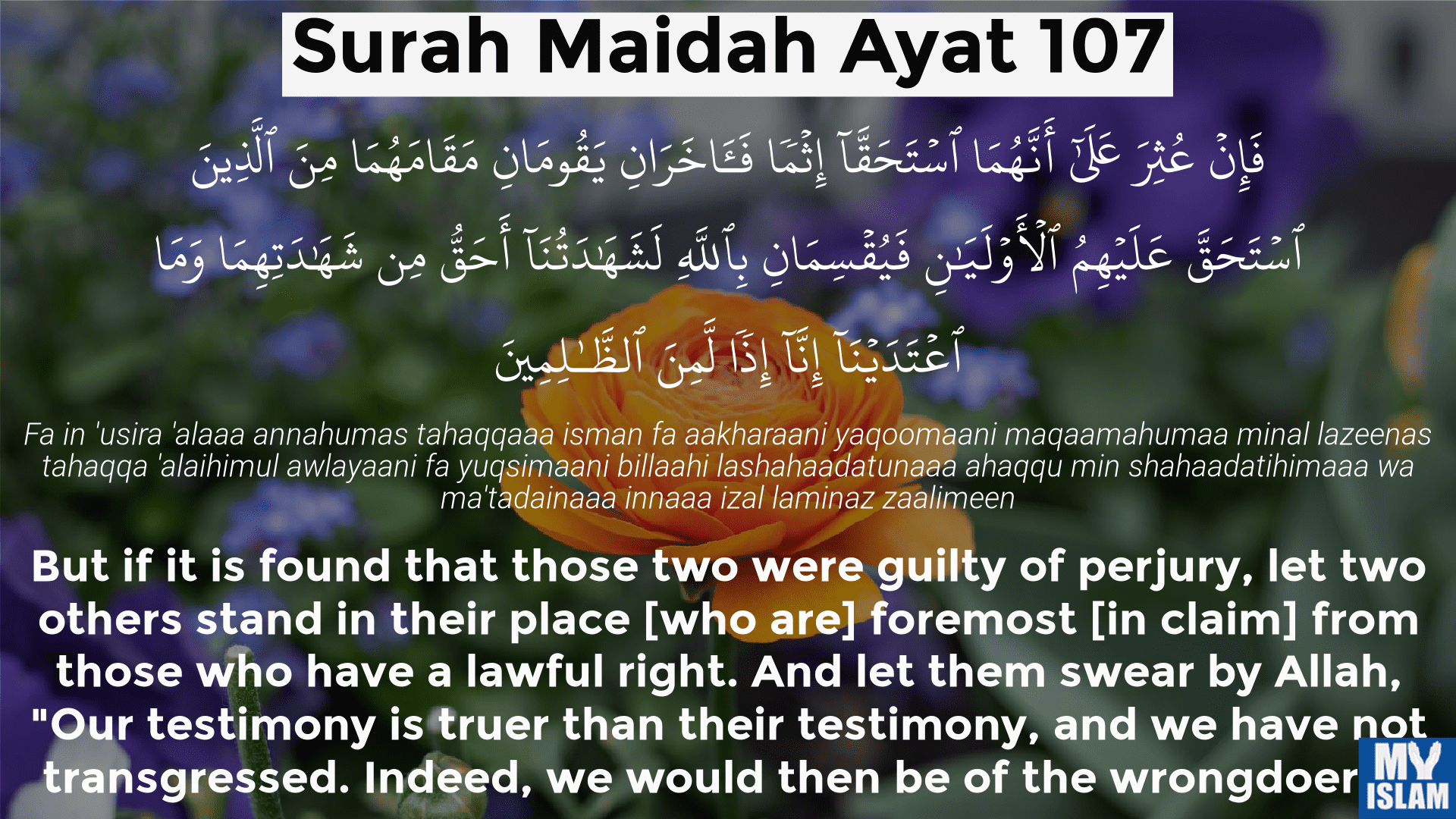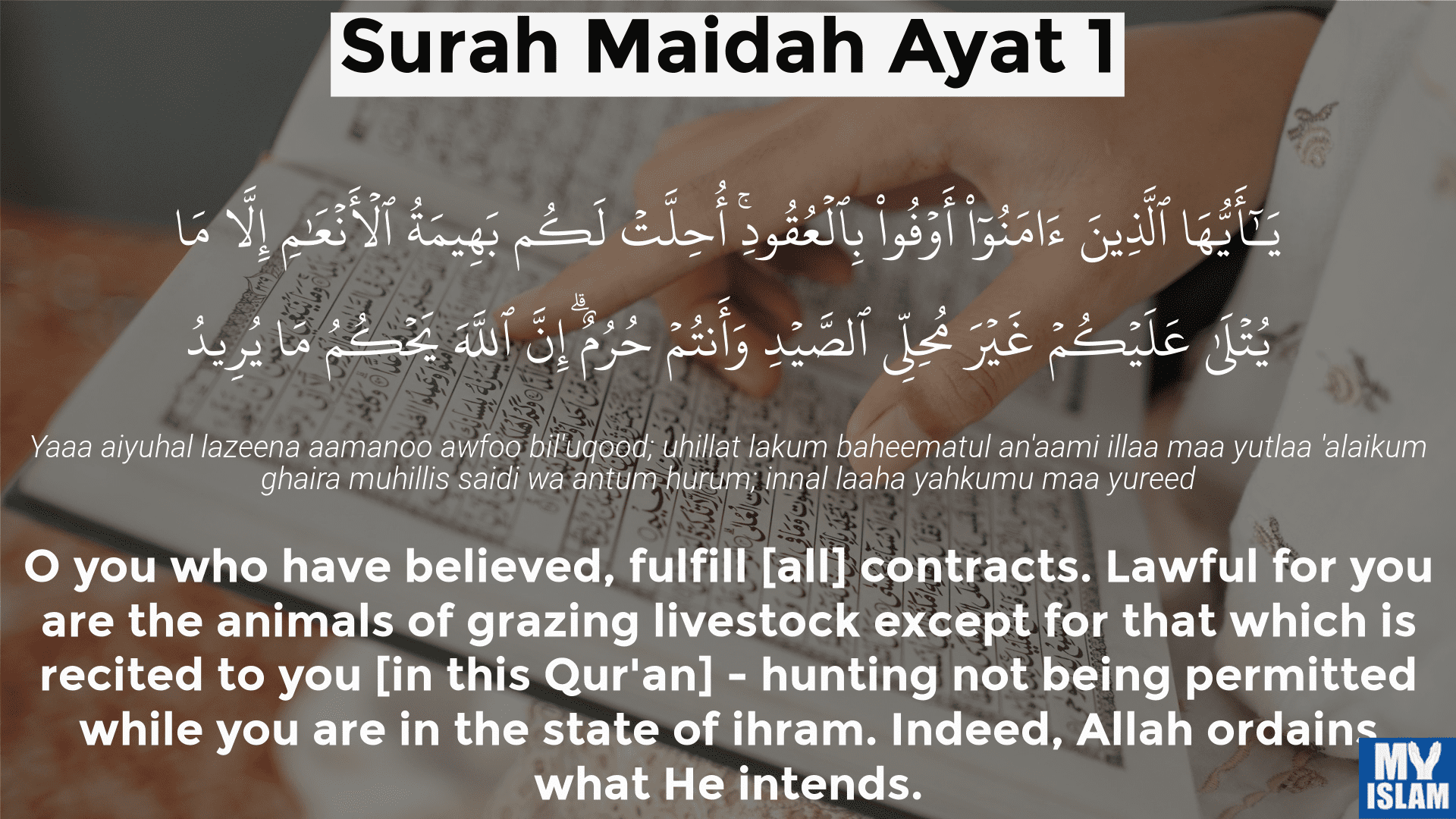Surah Al-Ma’idah Ayat 106 in Arabic Text
English Translation
Here you can read various translations of verse 106
O you who have believed, testimony [should be taken] among you when death approaches one of you at the time of bequest – [that of] two just men from among you or two others from outside if you are traveling through the land and the disaster of death should strike you. Detain them after the prayer and let them both swear by Allah if you doubt [their testimony, saying], “We will not exchange our oath for a price, even if he should be a near relative, and we will not withhold the testimony of Allah. Indeed, we would then be of the sinful.”
O ye who believe! When death approaches any of you, (take) witnesses among yourselves when making bequests,- two just men of your own (brotherhood) or others from outside if ye are journeying through the earth, and the chance of death befalls you (thus). If ye doubt (their truth), detain them both after prayer, and let them both swear by Allah: “We wish not in this for any worldly gain, even though the (beneficiary) be our near relation: we shall hide not the evidence before Allah: if we do, then behold! the sin be upon us!”
Believers! When death approaches you, let two men of equity among you act as witnesses when you make your bequest; or let two of those from others than yourselves act as witnesses if you are on a journey when the affliction of death befalls you. Then if any doubt occurs you shall detain both of them (in the mosque) after the Prayer, and they shall swear by Allah: ‘We shall neither sell our testimony in return for any gain even though it concerns any near of kin nor shall we conceal our testimony which we owe to Allah, for then we should become among sinners.’.
O you who believe! When death approaches any of you, and you make a bequest, then take the testimony of two just men of your own folk or two others from outside, if you are travelling through the land and the calamity of death befalls you. Detain them both after As-Salat (the prayer), (then) if you are in doubt (about their truthfulness), let them both swear by Allah (saying): “We wish not for any worldly gain in this, even though he (the beneficiary) be our near relative. We shall not hide Testimony of Allah, for then indeed we should be of the sinful.”
O ye who believe! Let there be witnesses between you when death draweth nigh unto one of you, at the time of bequest – two witnesses, just men from among you, or two others from another tribe, in case ye are campaigning in the land and the calamity of death befall you. Ye shall empanel them both after the prayer, and, if ye doubt, they shall be made to swear by Allah (saying): We will not take a bribe, even though it were (on behalf of) a near kinsman nor will we hide the testimony of Allah, for then indeed we should be of the sinful.
O you who have believed, the testimony between you, when death is present to any of you while bequeathing, shall be two (men) with (i.e. owning) a sense of justice or two others from other (folk), in case you are striking in the earth (i.e., traveling) so the affliction of death afflicts you. You shall detain them (both) after the prayer (s), then they shall swear by Allah, in case you are suspicious, “We will not trade it for a price, even if it were a near kinsman, nor will we keep back the testimony of Allah, (for) lo, surely in that case we are indeed of the vicious (people).”
You who believe, when death approaches any of you, let two just men from among you act as witnesses to the making of a bequest, or two men from another people if you are journeying in the land when death approaches. Keep the two witnesses back after prayer, if you have any doubts, and make them both swear by God, ‘We will not sell our testimony for any price, even if a close relative is involved. We will not hide God’s testimony, for then we should be doing wrong.’
اے ایمان والو! تمہارے آپس میں دو شخص کا گواه ہونا مناسب ہے جبکہ تم میں سے کسی کو موت آنے لگے اور وصیت کرنے کا وقت ہو وه دو شخص ایسے ہوں کہ دیندار ہوں خواه تم میں سے ہوں یا غیر لوگوں میں سے دو شخص ہوں اگر تم کہیں سفر میں گئے ہو اور تمہیں موت آ جائے اگر تم کو شبہ ہو تو ان دونوں کو بعد نماز روک لو پھر دونوں اللہ کی قسم کھائیں کہ ہم اس قسم کے عوض کوئی نفع نہیں لینا چاہتے اگر چہ کوئی قرابت دار بھی ہو اور اللہ تعالیٰ کی بات کو ہم پوشیده نہ کریں گے، ہم اس حالت میں سخت گنہگار ہوں گے
Quran 5 Verse 106 Explanation
For those looking for commentary to help with the understanding of Surah Al-Ma’idah ayat 106, we’ve provided two Tafseer works below. The first is the tafseer of Abul Ala Maududi, the second is of Ibn Kathir.
Ala-Maududi
(5:106) Believers! When death approaches you, let two men of equity among you act as witnesses when you make your bequest;[120] or let two of those from others than yourselves act as witnesses if you are on a journey when the affliction of death befalls you.[121] Then if any doubt occurs you shall detain both of them (in the mosque) after the Prayer, and they shall swear by Allah: ‘We shall neither sell our testimony in return for any gain even though it concerns any near of kin nor shall we conceal our testimony which we owe to Allah, for then we should become among sinners.’ .
120. That is, pious, straightforward and trustworthy Muslims.
That is, non-Muslims – Ed.
121. This shows that the testimony of non-Muslim witnesses in cases involving Muslims is appropriate only when no Muslim is available as a witness.
Ibn-Kathir
106. O you who believe! When death approaches any of you, and you make a bequest, then take the testimony of two just men of your own folk or two others from outside, if you are traveling through the land and the calamity of death befalls you. Detain them both after the Salah (the prayer), (then) if you are in doubt (about their truthfulness), let them both swear by Allah (saying): “We wish not for any worldly gain in this, even though he (the beneficiary) be our near relative. We shall not hide the testimony of Allah, for then indeed we should be of the sinful.” 107. If it then becomes known that these two had been guilty of sin, let two others stand forth in their places, nearest in kin from among those who claim a lawful right. Let them swear by Allah (saying): “We affirm that our testimony is truer than that of both of them, and that we have not trespassed (the truth), for then indeed we should be of the wrongdoers.” 108. That should make it closer (to the fact) that their testimony would be in its true nature and shape, or else they would fear that (other) oaths would be admitted after their oaths. And have Taqwa of Allah and listen (with obedience to Him). And Allah guides not the rebellious people.
This honorable Ayah contains a glorious ruling from Allah. Allah’s statement,
(O you who believe! When death approaches any of you, and you make a bequest, then take the testimony of two…) meaning that there should be two witnesses in such cases,
(just men…) thus, describing them as just,
(of your own folk) Muslims.
(or two others from outside) non-Muslims, meaning the People of the Book, according to Ibn `Abbas as Ibn Abi Hatim recorded. Allah said next,
(if you are traveling through the land) on a journey,
(and the calamity of death befalls you.) These are two conditions that permit using non-Muslims from among the Dhimmis for witnesses when there are no Muslims present: When one is traveling and needs to write a will, as Sharih Al-Qadi said. Ibn Jarir recorded that Sharih said, “The witness of the Jews and Christians is not allowed except while traveling, and even then only to witness the dictation of the will.” Allah’s statement,
(Detain them both after the Salah (the prayer),) refers to the `Asr prayer, according to Al-`Awfi who reported it from Ibn `Abbas. This is the same explanation reported from Sa`id bin Jubayr, Ibrahim An-Nakha`i, Qatadah, `Ikrimah and Muhammad bin Sirin. As for Az-Zuhri, he said that they are detained after Muslim prayer (i.e., in congregation). Therefore, these two witnesses will be detained after a congregational prayer,
(let them both swear by Allah if you are in doubt.) meaning, if you are in doubt that they might have committed treachery or theft, then they should swear by Allah,
(We wish not in this) in our vows, according to Muqatil bin Hayyan,
(for any worldly gain) of this soon to end life,
(even though he be our near relative.) meaning, if the beneficiary be our near relative, we will still not compromise on the truth.
(We shall not hide the testimony of Allah,) thus stating that the testimony is Allah’s, as a way of respecting it and valuing its significance,
(for then indeed we should be of the sinful.) if we distort the testimony, change, alter or hide it entirely. Allah said next,
(If it then becomes known that these two had been guilty of sin…) if the two witnesses were found to have cheated or stolen from the money that the will is being written about,
(let two others stand forth in their places, nearest in kin from among those who claim a lawful right.) This Ayah indicates that if the two witnesses were found to have committed treachery, then two of the nearest rightful inheritors should stand for witness in their place,
(Let them swear by Allah (saying): “We affirm that our testimony is truer than that of both of them…”) Meaning, our testimony that they have cheated is more truthful than the testimony that they have offered,
(and that we have not trespassed (the truth),) when we accused them of treachery,
(for then indeed we should be of the wrongdoers.) if we had lied about them. This is the oath of the heirs, and preference is to be given to their saying. Just as in the case with the oath of relative of a murdered person if he attempts to tarnish the case of the murdered person. So his family takes an oath in defense of his honor. This is discussed in the studies of the oaths in the books of Ahkam. Allah’s statement,
(That should make it closer (to the fact) that their testimony would be in its true nature and shape (and thus accepted),) means, the ruling requiring the two Dhimmi witnesses to swear, if there is a doubt that they were not truthful, might compel them to admit to the testimony in its true form. Allah’s statement,
(or else they would fear that (other) oaths would be admitted after their oaths.) means, requiring them to swear by Allah might encourage them to admit to the true testimony because they respect swearing by Allah and they glorify and revere Him. They also fear exposure if the heirs of the deceased are required to swear instead of them. In this case, the heirs would swear and earn the rightful inheritance that the two witnesses failed to declare. This is why Allah said,
(or else they would fear that (other) oaths would be admitted after their oaths.), then,
(And have Taqwa of Allah) in all of your affairs,
(and listen.) and obey,
(And Allah guides not the rebellious people.) who do not obey Him or follow His Law.
Quick navigation links






